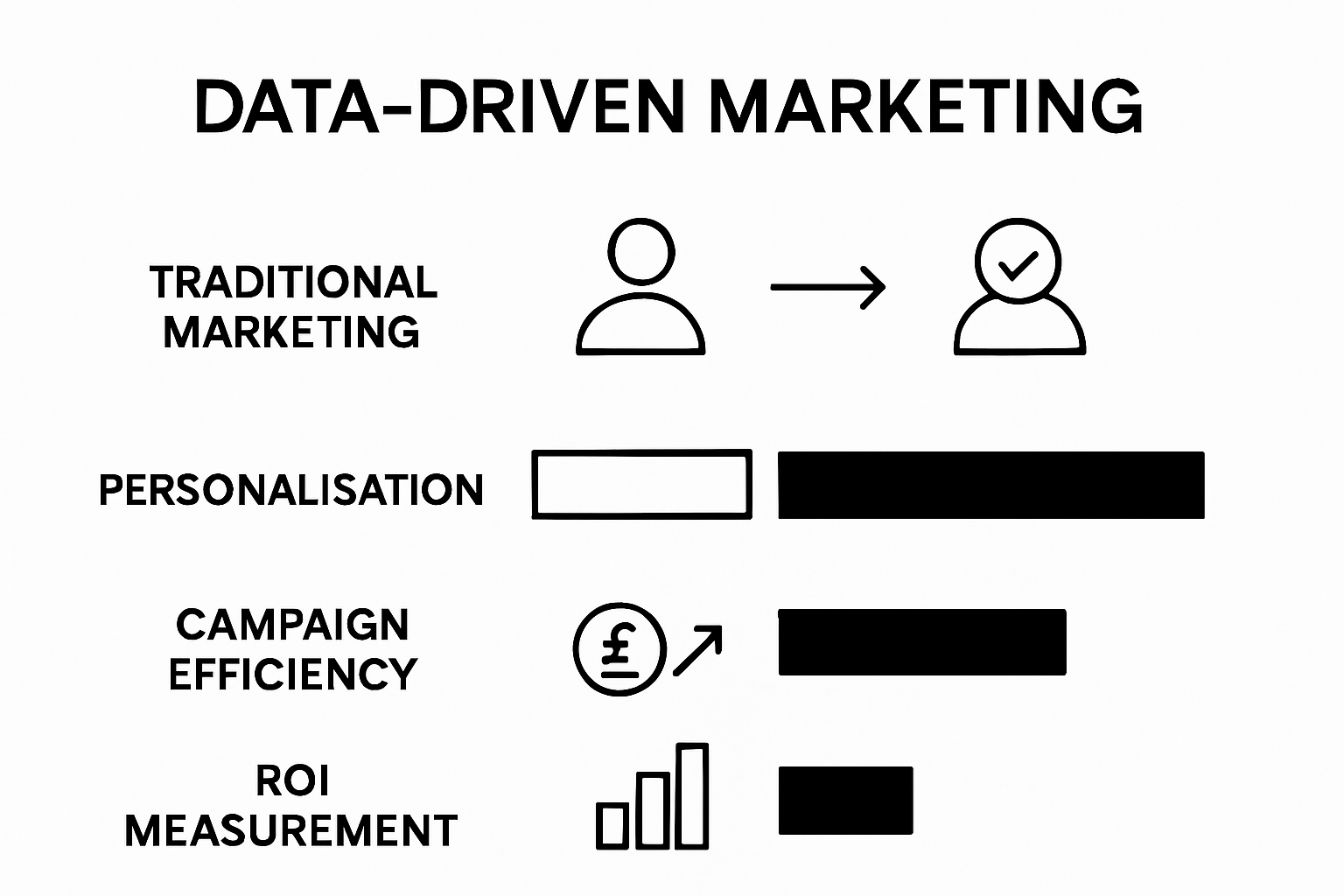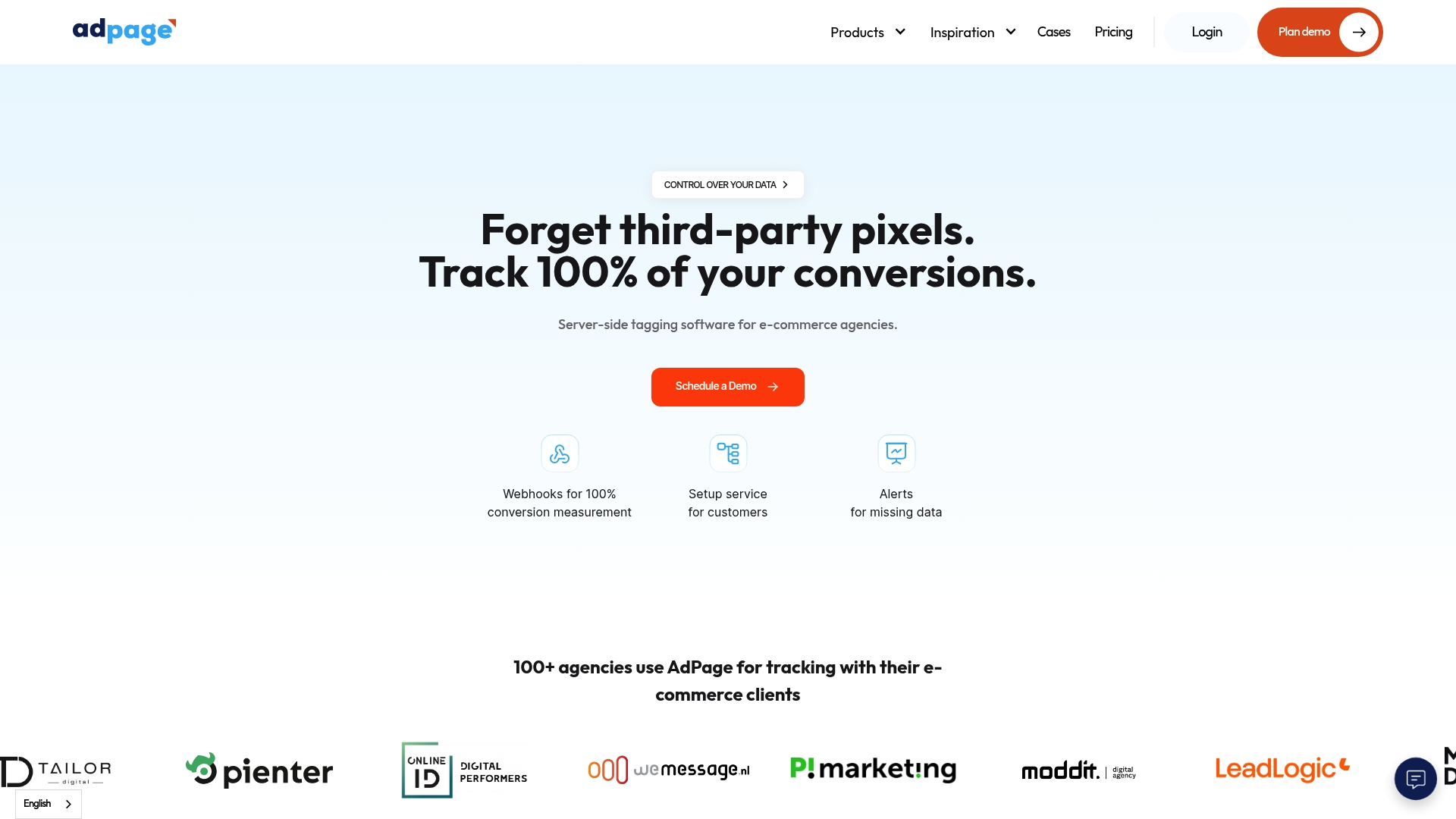Almost every brand talks about personalising their marketing with customer data. That makes sense as Netflix credits its data-driven strategies for saving over £1 billion a year in subscriber retention. Here is the surprise though. Data-driven marketing is not just about clever algorithms or flashy tech. It quietly transforms everyday decision-making, letting even small teams outsmart giants and predict what customers will do next.
Table of Contents
- Defining Data-Driven Marketing: Core Concepts And Principles
- The Importance Of Data In Modern Marketing Strategies
- How Data-Driven Marketing Influences Consumer Behaviour
- Key Tools And Technologies Used In Data-Driven Marketing
- Real-World Examples: Success Stories In Data-Driven Marketing
Quick Summary
| Takeaway | Explanation |
|---|---|
| Data enhances marketing precision | Leveraging detailed customer information allows businesses to tailor their marketing strategies effectively. |
| Focus on customer data collection | Granular, high-quality data is crucial for understanding behaviours and running personalised campaigns. |
| Predictive analytics drives success | Using advanced analytical tools enables businesses to forecast customer behaviour and optimise campaigns accordingly. |
| Personalisation increases engagement | Customised marketing communications significantly improve customer interaction and conversion rates. |
| Data is a strategic asset | Businesses should treat data as a vital resource to enhance marketing efficiency and competitive advantage. |
Defining Data-Driven Marketing: Core Concepts and Principles
Data-driven marketing represents a strategic approach where businesses leverage detailed customer data and advanced analytics to inform and optimise their marketing strategies. By systematically collecting, analysing, and interpreting consumer information, organisations transform raw data into actionable insights that drive more precise, personalised marketing efforts.
Understanding the Fundamental Framework
At its core, data-driven marketing moves beyond traditional intuition-based strategies by providing empirical evidence for decision-making. Comprehensive marketing analytics enable businesses to understand customer behaviours, preferences, and potential future actions with remarkable precision.
Key principles of this approach include:
- Collecting granular, high-quality customer data
- Utilising advanced analytical tools for deep insights
- Creating personalised marketing experiences
- Continuously measuring and refining marketing strategies
Strategic Implementation and Value Proposition
The strategic value of data-driven marketing lies in its ability to transform generic marketing campaigns into targeted, resonant communications. By understanding specific customer segments, businesses can craft messages that speak directly to individual needs, preferences, and pain points.
This approach enables marketers to:
- Predict customer behaviour more accurately
- Reduce marketing expenditure through targeted campaigns
- Improve customer engagement and conversion rates
- Develop more nuanced understanding of audience demographics
While traditional marketing relied on broad, generalised approaches, data-driven strategies allow for unprecedented levels of personalisation and precision.
 Read more about tracking customer insights to enhance your marketing effectiveness.
Read more about tracking customer insights to enhance your marketing effectiveness.
The Importance of Data in Modern Marketing Strategies
In the contemporary digital ecosystem, data has emerged as the fundamental currency of marketing intelligence. Modern businesses recognise that strategic decision-making no longer relies on intuition but demands empirical evidence derived from comprehensive data analysis. Research from leading marketing analytics platforms confirms that organisations leveraging robust data strategies gain significant competitive advantages.
Transforming Marketing Decision Making
Data fundamentally reshapes how marketers understand and engage with their target audiences. By converting complex customer interactions into measurable insights, businesses can create more nuanced, responsive marketing approaches. This transformation encompasses several critical dimensions:
- Predictive customer behaviour modelling
- Real-time audience segmentation
- Personalised communication strategies
- Dynamic campaign optimization
Strategic Value and Competitive Advantage
The strategic importance of data extends beyond mere information gathering. Advanced data analytics enable businesses to anticipate market trends, understand customer preferences, and develop highly targeted marketing interventions. Companies that effectively harness data can reduce marketing expenditure while simultaneously improving engagement rates and conversion potential.
Key strategic benefits include:
- Enhanced customer understanding
- More efficient resource allocation
- Improved marketing ROI measurement
- Faster adaptation to market changes
Explore advanced marketing strategy techniques to transform your data-driven approach and unlock unprecedented marketing potential. By treating data as a strategic asset, businesses can move from reactive marketing tactics to proactive, intelligent customer engagement strategies.
How Data-Driven Marketing Influences Consumer Behaviour
Data-driven marketing fundamentally transforms the relationship between businesses and consumers by enabling unprecedented levels of personalised understanding and interaction. By meticulously analysing consumer data, organisations can now predict, anticipate, and respond to individual customer preferences with remarkable precision.
Psychological Foundations of Consumer Insights
Consumer behaviour research reveals that modern consumers expect personalised experiences that reflect their unique preferences and needs. Data-driven strategies allow marketers to decode complex psychological patterns, understanding not just what customers purchase, but why they make specific buying decisions.
Key psychological insights include:
- Mapping emotional triggers behind purchasing decisions
- Understanding subconscious consumer motivations
- Identifying contextual factors influencing behaviour
- Predicting potential future purchasing patterns
Personalisation and Behavioural Targeting
Advanced data analytics enable marketers to create hyper-personalised experiences that resonate deeply with individual consumers. By segmenting audiences based on intricate behavioural data, businesses can craft communication strategies that feel genuinely tailored and relevant.
Consumer behaviour modification strategies encompass:
- Dynamic content recommendations
- Contextually relevant advertising
- Predictive customer journey mapping
- Individualised engagement touchpoints
Explore emerging digital marketing trends that are reshaping how businesses understand and interact with their target audiences. By leveraging sophisticated data analysis techniques, organisations can create more meaningful, responsive marketing approaches that genuinely connect with consumers on a profound psychological level.

Key Tools and Technologies Used in Data-Driven Marketing
The landscape of data-driven marketing is powered by sophisticated technological ecosystems that transform raw information into actionable strategic insights. Modern marketing technologies enable businesses to collect, analyse, and leverage customer data with unprecedented precision and depth.
To better illustrate the different core components that enable effective data-driven marketing, the table below summarises the key tools, their functions, and the value they provide to marketing teams.
| Tool/Technology | Main Function | Strategic Value |
|---|---|---|
| Customer Relationship Management (CRM) systems | Organise and manage detailed customer information | Enable targeted campaign planning and management |
| Web analytics platforms | Track user behaviour and site interactions | Inform optimised website and campaign strategies |
| Social media monitoring tools | Analyse engagement and sentiment across social media | Identify trends and audience preferences |
| Machine learning data aggregation systems | Integrate and process large, complex data sets | Uncover hidden patterns and predictive insights |
| Predictive analytics engines | Forecast customer actions using historical data | Support proactive decision-making |
| Artificial intelligence segmentation tools | Group audiences based on behaviour and profiles | Personalise messages and improve conversion rates |
| Advanced statistical modelling software | Analyse trends and test campaign efficacy | Measure ROI and improve marketing effectiveness |
Data Collection and Management Platforms
Advanced marketing analytics platforms provide comprehensive solutions for capturing and organising complex customer interaction data. These technologies integrate multiple data sources, creating holistic customer profiles that enable deeper understanding of consumer behaviours and preferences.
Key data collection technologies include:
- Customer Relationship Management (CRM) systems
- Web analytics platforms
- Social media monitoring tools
- Machine learning data aggregation systems
Analytical Technologies and Predictive Modelling
Sophisticated analytical technologies transform raw data into strategic intelligence, enabling marketers to predict consumer behaviour with remarkable accuracy. These tools leverage complex algorithms and machine learning techniques to uncover hidden patterns and potential future trends.
Critical analytical technologies encompass:
- Predictive analytics engines
- Artificial intelligence segmentation tools
- Real-time data processing platforms
- Advanced statistical modelling software
Explore digital marketing analytics techniques that are revolutionising how businesses understand and engage with their target audiences. By integrating cutting-edge technological solutions, organisations can develop more intelligent, responsive marketing strategies that deliver genuine value to consumers.
Real-World Examples: Success Stories in Data-Driven Marketing
Data-driven marketing transcends theoretical concepts, delivering tangible business transformation through strategic insights and intelligent application. Successful organisations demonstrate how sophisticated data analysis can revolutionise customer engagement, drive revenue, and create competitive advantages.
Technology and Entertainment Industry Innovations
Research on marketing analytics reveals compelling case studies of data-driven success. Netflix exemplifies this approach by leveraging complex viewer data to personalise content recommendations and develop original programming that precisely matches audience preferences.
Key strategic approaches include:
- Analysing individual viewing patterns
- Creating targeted content recommendations
- Developing audience-specific original programming
- Predicting content performance before production
E-commerce and Retail Transformation
Online retailers have pioneered data-driven marketing strategies that fundamentally reshape consumer interactions. Amazon’s recommendation engine, powered by sophisticated machine learning algorithms, demonstrates how granular data analysis can drive significant revenue growth by creating personalised shopping experiences.
Transformative retail data strategies encompass:
- Hyper-personalised product recommendations
- Dynamic pricing optimisation
- Predictive inventory management
- Contextual marketing communications
Explore advanced email marketing strategies that leverage data-driven insights to enhance customer engagement. By understanding and implementing these sophisticated approaches, businesses can unlock unprecedented opportunities for growth and customer connection.
Transform Your Data-Driven Marketing With AdPage’s Advanced Tracking Solutions
If you have ever struggled with incomplete data, lost conversions, or a lack of precision in marketing analytics, you are not alone. The article highlighted just how crucial accurate data collection and personalisation are for creating effective data-driven marketing strategies. Many online marketers and agencies find their efforts held back by unreliable tracking systems or frequent data loss from traditional analytics tools. In today’s fast-paced digital environment, making every conversion count is more important than ever.

It is time to overcome these challenges with a solution built for results. AdPage lets you monitor 100 percent of your conversions using secure server-side tagging, so you never miss a customer action. Enjoy robust consent management, GDPR compliance, and seamless integration with Shopify, WooCommerce, or Magento. Our platform transforms raw information into actionable insights, helping you reduce wasted spend while increasing engagement and sales. Ready to empower your next campaign? Discover the difference with AdPage and optimise your marketing tracking today. Start making smarter data-driven decisions that put you ahead of the competition.
Frequently Asked Questions
What is data-driven marketing?
Data-driven marketing is a strategic approach that utilises detailed customer data and advanced analytics to inform and optimise marketing strategies, enabling personalised marketing efforts through actionable insights.
Why is data important in modern marketing?
Data serves as a fundamental currency of marketing intelligence, transforming decision-making from intuition-based to empirical evidence, allowing businesses to anticipate market trends and consumer behaviour.
How does data-driven marketing influence consumer behaviour?
Data-driven marketing enables businesses to create highly personalised experiences by analysing consumer data to predict individual preferences and needs, thereby enhancing customer engagement and satisfaction.
What tools are essential for effective data-driven marketing?
Essential tools include Customer Relationship Management (CRM) systems, web analytics platforms, social media monitoring tools, and advanced analytical technologies that facilitate data collection, analysis, and predictive modelling.



.png)
